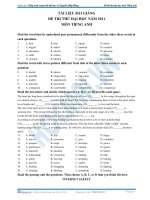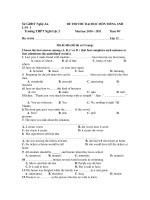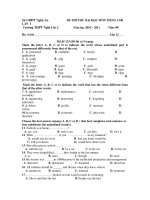- Trang chủ >>
- Mầm non - Tiểu học >>
- Lớp 2
Đề thi thử THPT QG môn Tiếng Anh năm 2017 THPT chuyên Lam Sơn Thanh Hóa
Bạn đang xem bản rút gọn của tài liệu. Xem và tải ngay bản đầy đủ của tài liệu tại đây (1.13 MB, 6 trang )
<span class='text_page_counter'>(1)</span><div class='page_container' data-page=1>
<b>SỞ GD ĐT </b>
<b>TỈNH THANH HĨA </b>
<b>THPT CHUN LAM SƠN </b>
<i>(Đề thi có 50 câu / 5 trang) </i>
<b>ĐỀ THI THỬ THPT QUỐC GIA NĂM 2017 </b>
<b>Môn: Tiếng Anh </b>
<i>Thời gian làm bài: 60 phút, không k ể thời gian phát đề </i>
<i><b>Read the following passage and mark the letter A, B, C or D on your answer sheet to indicate the correct word </b></i>
<i><b>or phrase that best fits each of the numbered blanks from 1 to 5.</b></i>
The warming of the Earth is caused by exhaust gas from automobile engines, fatories and power
(1)_________. Carbon dioxide goes up into the atmosphere, and it form a kind of screen that keeps or allows the
sunshine in but stop the Earth heart (2) _________getting out. It works like a greenhouse, that’s why we call (3)
_________the Green House effect.
Because of this effect, the Earth is getting warmer all the time. This (4) _________in temperature will
cause big changes to the world’s climate. The sea level will increase as the ice (5) _________the poles will melt.
<b>Question 1: </b> <b>A.</b> companies <b>B.</b> factories <b>C.</b> sites <b>D.</b> stations
<b>Question 2: </b> <b>A.</b> from <b>B.</b> up <b>C.</b> against <b>D.</b> away
<b>Question 3: </b> <b>A.</b> is <b>B.</b> be <b>C.</b> it <b>D.</b> them
<b>Question 4: </b> <b>A.</b> raise <b>B.</b> rise <b>C.</b> drop <b>D.</b> fall
<b>Question 5: </b> <b>A.</b> covering <b>B.</b> covers <b>C.</b> covered <b>D.</b> cover
<i><b>Mark the letter A, B, C or D on your answer sheet to indicate the word(s) CLOSEST in meaning to the </b></i>
<i><b>underlined word(s) in each of the following question.</b></i>
<b>Question 6: </b>It was <b>relatively</b> easy for him to learn baseball because he had been a cricket player.
<b>A.</b> approximately <b>B.</b> comparatively <b>C.</b> nearly <b>D.</b> essentially
<b>Question 7: </b>You have to <b>be on your toes</b> if you want to beat her.
<b>A.</b> pay all your attention to what you are doing
<b>B.</b> upset her in what she is doing
<b>C.</b> get involved in what she is doing
<b>D.</b> make her comply with your orders
<i><b>Mark the letter A, B, C or D on your answer sheet to indicate the word whose underlined part differs from the </b></i>
<i><b>other three in pronunciation in each of the following question.</b></i>
<b>Question 8: </b> <b>A.</b> accurate <b>B.</b> account <b>C.</b> accept <b>D.</b> accuse
<b>Question 9: </b> <b>A.</b> talks <b>B.</b> takes <b>C.</b> decides <b>D.</b> completes
<i><b>Mark the letter A, B, C or D on your answer sheet to indicate the word having different stress from the others in </b></i>
<i><b>each of the following questions.</b></i>
<b>Question 10: A.</b> rapidly <b>B.</b> comfortably <b>C.</b> fluently <b>D.</b> necessarily
<b>Question 11: A.</b> politician <b>B.</b> genetics <b>C.</b> artificial <b>D.</b> controversial
<i><b>Mark the letter A, B, C or D on your answer sheet to indicate the underlined part that needs correction in each </b></i>
<i><b>of the following questions </b></i>
<b>Question 12: </b>Foreign students who are (A)doing a decision (B) about which school (C) to attend may not know
exactly where (D) the choices are located.
<b>Question 13: </b>(A) It is a good idea (B) to be careful in buying (C) or purchasing magazines (D) from salespersons
who may come to your door.
</div>
<span class='text_page_counter'>(2)</span><div class='page_container' data-page=2>
<b>Question 14: </b>In (A) that age of computers, (B) it is difficult to imagine how tedious (C) work of accountants and
clerks must (D) have been in the past.
<i><b>Mark the letter A, B, C or D on your answer sheet to indicate the correct answer to each of the following </b></i>
<i><b>questions.</b></i>
<b>Question 15: </b>Since he failed his exam, he had to_________for it again.
<b>A.</b> pass <b>B.</b> make <b>C.</b> take <b>D.</b> sit
<b>Question 16: </b>Is there_________at all I can help?
<b>A.</b> everything <b>B.</b> anything <b>C.</b> something <b>D.</b> one thing
<b>Question 17: </b>Don’t worry. He’ll do the job as_________as possible.
<b>A.</b> economizing <b>B.</b> econimic <b>C.</b> economical <b>D.</b> economically
<b>Question 18: </b>Only when you grow up, _________the truth.
<b>A.</b> you will know <b>B.</b> you know <b>C.</b> do you know <b>D.</b> will you know
<b>Question 19: </b>My brother left his job last week because he did not have any_________to travel.
<b>A.</b> position <b>B.</b> chance <b>C.</b> ability <b>D.</b> location
<b>Question 20: </b>John paid $2 for his meal, _________he had thought it would cost.
<b>A.</b> not as much <b>B.</b> not so much as <b>C.</b> less as <b>D.</b> not so many as
<b>Question 21: </b>It is very important for a film or a company to keep_________the changes in the market.
<b>A.</b> pace of <b>B.</b> track about <b>C.</b> touch with <b>D.</b> up with
<b>Question 22: </b>I’m sure you’ll have no_________the exam.
<b>A.</b> difficulty passing <b>B.</b> difficulties to pass <b>C.</b> difficulty to pass <b>D.</b> difficulties of passing
<b>Question 23: </b>I_________this letter around for days without looking at it.
<b>A.</b> carry <b>B.</b> must carry <b>C.</b> have been carrying <b>D.</b> am carrying
<b>Question 24: </b>Vietnam’s rice export this year will decrease_________about 10%, compared with that of last year.
<b>A.</b> with <b>B.</b> at <b>C.</b> by <b>D.</b> on
<b>Question 25: </b>I won’t change my mind_________what you say.
<b>A.</b> whether <b>B.</b> no matter <b>C.</b> because <b>D.</b> although
<b>Question 26: </b>My car isn’t_________. It’s always letting me down.
<b>A.</b> believable <b>B.</b> reliable <b>C.</b> colorable <b>D.</b> conceivable
<i><b>Mark the letter A, B, C or D on your answer sheet to indicate the most suitable response to complete each of the </b></i>
<i><b>following exchanges.</b></i>
<b>Question 27: </b>- “ Has an annoucement been made about the eight o’clock flight to Paris?”
- “ .”
<b>A.</b> Not yet <b>B.</b> Yes, it was <b>C.</b> I don’t think that <b>D.</b> Sorry, I don’t
<b>Question 28: </b>- “ I can speak English well enough to apply for that post.”
- “ .”
<b>A.</b> Me neither <b>B.</b> Me too <b>C.</b> Me either <b>D.</b> Me also
<i><b>Mark the letter A, B, C or D on your answer sheet to indicate the word(s) OPPOSITE in the meaning to the </b></i>
<i><b>underlined word(s) in ecah of the following questions.</b></i>
<b>Question 29: </b>I’m sorry to say that it seems you’ve been <b>shirking</b> your responsibilities.
<b>A.</b> going along <b>B.</b> standing up to <b>C.</b> taking on <b>D.</b> refraining from
<b>Question 30: </b>She gave an <b>impeccable</b> reading of the sonata and had the audience on their feet.
</div>
<span class='text_page_counter'>(3)</span><div class='page_container' data-page=3>
<i><b>Mark the letter A, B, C or D on your answer sheet to indicate the sentence that is closest inmeaning to each of </b></i>
<i><b>the following question.</b></i>
<b>Question 31: I got the impression that the boys were not enjoying themselves.</b>
<b>A.</b> The boys impressed me that they were not enjoying themselves.
<b>B.</b> The boys didn’t seem to be enjoying themselves.
<b>C.</b> The boys seemed not to enjoying themselves.
<b>D.</b> It seemed to me the boys were enjoying themselves.
<b>Question 32: The children ran to the field to see the dragon, but it was no longer there.</b>
<b>A.</b> The dragon had gone by the time the children ran to the filed.
<b>B.</b> The dragon went by the time the children ran to the filed.
<b>C.</b> When the children ran to the filed, the dragon went.
<b>D.</b> The dragon had gone after the children ran to the filed.
<b>Question 33: The boy became so confused and worried that he left home.</b>
<b>A.</b> The boy became too confused and worried to leave home.
<b>B.</b> So confued and worried that the boy left home.
<b>C.</b> So confused and worried, the boy left home.
<b>D.</b> The boy was not confused and worried enough to leave home.
<i><b>Mark the letter A, B, C or D on your answer sheet to indicate the sentence that best combines each pair of </b></i>
<i><b>sentences in the following questions.</b></i>
<b>Question 34: Sue lives in a house. The house is opposite my house.</b>
<b>A.</b> Sue lives in a house where is opposite my house.
<b>B.</b> Sue lives in a house which is opposite my house.
<b>C.</b> Sue lives in a house who is opposite my house.
<b>D.</b> Sue lives in a house and which is opposite my house.
<b>Question 35: She turned the radio on at 7.30. She was still listening to it when her mother came home at 9.00.</b>
<b>A.</b> She has been listening to the radio at 7.30.
<b>B.</b> She had been listening to the radio since 7.30.
<b>C.</b> She has been listening to the radio after 7.30.
<b>D.</b> She had been listening to the radio by 7.30.
<i><b>Read the following passage and mark the letters A, B, C or D on your answer sheet to indicate the correct </b></i>
<i><b>answer to each of the questions</b></i>
</div>
<span class='text_page_counter'>(4)</span><div class='page_container' data-page=4>
<b>Question 36: </b>The topic of this passage is______________.
<b>A.</b> reactions to foods <b>B.</b> food and nutrition <b>C.</b> infants and allergies <b>D.</b> a good diet
<b>Question 37: </b>According to the passage, the difficulty in diagnosing allergies to foods is due to ______________.
<b>A.</b> the vast number of different foods we eat
<b>B.</b> lack of a proper treatment plan
<b>C.</b> the similarity of symptoms of the allergy to other problems
<b>D.</b> the use of prepared formula to feed babies
<b>Question 38: </b>The word "<b>symptoms</b>" is closest in meaning to______________.
<b>A.</b> indications <b>B.</b> diet <b>C.</b> diagnosis <b>D.</b> prescriptions
<b>Question 39: </b>The phrase "<b>set off</b>" is closest in meaning to______________.
<b>A.</b> relieved <b>B.</b> identified <b>C.</b> avoided <b>D.</b> triggered
<b>Question 40: </b>What can be inferred about babies from this passage?
<b>A.</b> They can eat almost anything.
<b>B.</b> They should have a carefully restricted diet as infants.
<b>C.</b> They gain little benefit from being breast fed.
<b>D.</b> They may become hyperactive if fed solid food too early.
<b>Question 41: </b>The word <b>"hyperactive</b>" is closest in meaning to______________.
<b>A.</b> overly active <b>B.</b> unusually low activity
<b>C.</b> excited <b>D.</b> inquisitive
<b>Question 42: </b>The author states that the reason that infants need to avoid certain foods related to allergies has to do
with the infant's______________.
<b>A.</b> lack of teeth <b>B.</b> poor metabolism
<b>C.</b> underdeveloped intestinal tract <b>D.</b> inability to swallow solid foods
<i><b>Read the following passage and mark the letters A, B, C or D on your answer sheet to indicate the correct </b></i>
<i><b>answer to each of the questions </b></i>
The rapid transcontinentat settlement and these new urban industrial circumstances of the last half of the 19th
century were accompanied by the development of national literature of great abundance and variety. New themes,
new forms, new subjects, new regions, new authors, new audiences all emerged in the literature of this half
century.
As a result, at the onset of World War I, the spirit and substance of American literature
had <b>evolved</b> remarkably, just as its center of production had shifted from Boston to New York in the late 1880s and
the sources of its energy to Chicago and the Midwest. No longer was <b>it</b> produced, at least in its popular forms, in
the main by solemn, typically moralistic men from New England and the Old South; no longer were polite,
well-dressed, grammatically correct, middle-class young people the only central characters in its narratives; no longer
were these narratives to be set in <b>exotic</b> places and remote times; no longer, <b>indeed</b>, were fiction, poetry, drama,
and formal history the chief acceptable forms of literary expression; no longer, finally, was literature read primarily
by young, middle class women.
In sum, American literature in <b>these years</b> fulfilled in considerable measure the condition Walt Whitman
called for in 1867 in describing Leaves of Grass: it treats, he said of his own major work, each state and region as
peers "and expands from them, and includes the world ... connecting an American citizen with the citizens of all
nations."
<b>Question 43: The main idea of this passage is</b>________.
<b>A.</b> that the new American literature was less provincial than the old
<b>B.</b> that World War I caused a dramatic change in America
<b>C.</b> that centers of culture shifted from East to West
<b>D.</b> that most people were wary of the new literature
<b>Question 44: </b>It can be inferred from the passage that the previous passage probably discussed________.
<b>A.</b> the importance of tradition to writers
</div>
<span class='text_page_counter'>(5)</span><div class='page_container' data-page=5>
<b>C.</b> the fashions and values of 19th century America
<b>D.</b> the limitations of American literature to this time
<b>Question 45: </b>The word “<b>evolved</b>” in paragraph two is closest in meaning to________.
<b>A.</b> became famous <b>B.</b> turned back <b>C.</b> diminished <b>D.</b> changed
<b>Question 46: </b>The word “<b>it</b>” in the second paragraph refers to________.
<b>A.</b> the population <b>B.</b> the energy <b>C.</b> American literature <b>D.</b> the manufacturing
<b>Question 47: </b>The word “<b>exotic</b>" in paragraph two is closest in meaning to________.
<b>A.</b> urban <b>B.</b> unusual <b>C.</b> well-known <b>D.</b> old-fashioned
<b>Question 48: </b>The author uses the word “<b>indeed</b>” in the second paragraph for what purpose?
<b>A.</b> To emphasize the contrast he is making.
<b>B.</b> For variety in a lengthy paragraph.
<b>C.</b> To wind down his argument.
<b>D.</b> To show a favorable attitude to these forms of literature.
<b>Question 49: </b>The phrase <b>“these years” </b>in the third paragraph refers to________.
<b>A.</b> 1850-1900 <b>B.</b> the 1900s <b>C.</b> the early 1800s <b>D.</b> the present
<b>Question 50: </b>It can be inferred from the passage that Walt Whitman________.
<b>A.</b> disliked urban life <b>B.</b> was disapproving of the new
literature
<b>C.</b> wrote Leaves of Grass <b>D.</b> was an international diplomat
<b>ĐÁP ÁN: </b>
1.D 11.B 21.D 31.B 41.A
2.A 12.A 22.A 32.A 42.C
3.C 13.C 23.C 33.C 43.A
4.B 14.A 24.C 34.B 44.B
5.A 15.D 25.B 35.B 45.D
6.B 16.B 26.B 36.A 46.C
7.A 17.D 27.A 37.C 47.B
8.A 18.D 28.B 38.A 48.A
9.C 19.B 29.A 39.D 49.A
</div>
<span class='text_page_counter'>(6)</span><div class='page_container' data-page=6>
Website
<b>HOC247</b>
cung c
ấ
p m
ột môi trườ
ng
<b>h</b>
<b>ọ</b>
<b>c tr</b>
<b>ự</b>
<b>c tuy</b>
<b>ế</b>
<b>n</b>
sinh độ
ng, nhi
ề
u
<b>ti</b>
<b>ệ</b>
<b>n ích thơng minh</b>
,
n
ộ
i dung bài gi
ảng đượ
c biên so
ạ
n công phu và gi
ả
ng d
ạ
y b
ở
i nh
ữ
ng
<b>giáo viên nhi</b>
<b>ều năm kinh </b>
<b>nghi</b>
<b>ệ</b>
<b>m, gi</b>
<b>ỏ</b>
<b>i v</b>
<b>ề</b>
<b> ki</b>
<b>ế</b>
<b>n th</b>
<b>ứ</b>
<b>c chuyên môn l</b>
<b>ẫ</b>
<b>n k</b>
<b>ỹ</b>
<b>năng sư phạ</b>
<b>m</b>
đế
n t
ừ
các trường Đạ
i h
ọ
c và các
trườ
ng chuyên danh ti
ế
ng.
<b>I.</b>
<b>Luy</b>
<b>ệ</b>
<b>n Thi Online </b>
- <b>Luyên thi ĐH, THPT QG:</b>Đội ngũ <b>GV Giỏi, Kinh nghiệm</b> từ các Trường ĐH và THPT danh tiếng xây
dựng các khóa <b>luyện thi THPTQG </b>các mơn: Tốn, NgữVăn, Tiếng Anh, Vật Lý, Hóa Học và Sinh Học.
- <b>Luyện thi vào lớp 10 chuyên Toán: </b>Ôn thi <b>HSG lớp 9</b> và <b>luyện thi vào lớp 10 chuyên Toán</b> các
trường <i>PTNK, Chuyên HCM (LHP-TĐN-NTH-GĐ), Chuyên Phan Bội Châu Nghệ An </i>và các trường Chuyên
khác cùng TS.Tr<i>ần Nam Dũng, TS. Pham Sỹ Nam, TS. Trịnh Thanh Đèo và Thầy Nguyễn Đức Tấn. </i>
<b>II.</b>
<b>Khoá H</b>
<b>ọ</b>
<b>c Nâng Cao và HSG </b>
- <b>Toán Nâng Cao THCS:</b> Cung cấp chương trình Tốn Nâng Cao, Toán Chuyên dành cho các em HS THCS
lớp 6, 7, 8, 9 u thích mơn Tốn phát triển tư duy, nâng cao thành tích học tập ởtrường và đạt điểm tốt
ở các kỳ thi HSG.
- <b>Bồi dưỡng HSG Tốn:</b> Bồi dưỡng 5 phân mơn Đạ<b>i Số, Số Học, Giải Tích, Hình Học </b>và <b>Tổ Hợp</b> dành cho
học sinh các khối lớp 10, 11, 12. Đội ngũ Giảng Viên giàu kinh nghiệm: <i>TS. Lê Bá Khánh Trình, TS. Trần </i>
<i>Nam Dũng, TS. Pham Sỹ Nam, TS. Lưu Bá Thắng, Thầy Lê Phúc Lữ, Thầy Võ Quốc Bá Cẩn </i>cùng đơi HLV đạt
thành tích cao HSG Quốc Gia.
<b>III.</b>
<b>Kênh h</b>
<b>ọ</b>
<b>c t</b>
<b>ậ</b>
<b>p mi</b>
<b>ễ</b>
<b>n phí </b>
- <b>HOC247 NET:</b> Website hoc miễn phí các bài học theo chương trình SGK từ lớp 1 đến lớp 12 tất cả các
môn học với nội dung bài giảng chi tiết, sửa bài tập SGK, luyện tập trắc nghiệm mễn phí, kho tư liệu tham
khảo phong phú và cộng đồng hỏi đáp sôi động nhất.
- <b>HOC247 TV:</b> Kênh <b>Youtube</b> cung cấp các Video bài giảng, chuyên đề, ôn tập, sửa bài tập, sửa đề thi miễn
phí từ lớp 1 đến lớp 12 tất cả các mơn Tốn- Lý - Hố, Sinh- Sử - Địa, NgữVăn, Tin Học và Tiếng Anh.
<i><b>V</b></i>
<i><b>ữ</b></i>
<i><b>ng vàng n</b></i>
<i><b>ề</b></i>
<i><b>n t</b></i>
<i><b>ảng, Khai sáng tương lai</b></i>
<i><b> Học mọi lúc, mọi nơi, mọi thiết bi – Tiết kiệm 90% </b></i>
<i><b>Học Toán Online cùng Chuyên Gia </b></i>
</div>
<!--links-->









